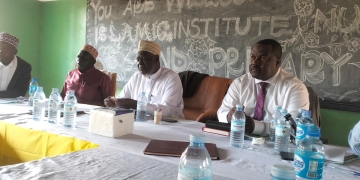
KAMPALA — Lawyers are on edge as the High Court’s Criminal Division prepares to deliver a critical ruling at 10 a.m. today in the Henry Katanga murder trial.
The ruling will determine the admissibility of digital forensics evidence, a decision that could significantly impact the case’s outcome.
The defense has challenged the admissibility of evidence presented by Prosecution Witness 10, a police digital forensics expert.
They argue that the evidence, aside from the witness’s qualifications, should be excluded due to alleged illegalities and non-disclosure during the collection process.
The defense claims that the Uganda Police and prosecution violated several laws in obtaining the evidence.
Last week, the courtroom, presided over by Judge Isaac Muwata, was packed as the prosecution and defense debated the inclusion of crucial electronic evidence. The contested evidence includes CCTV footage and mobile phone data collected from Katanga’s residence.
Defense attorney Macdosman Kabega contended that the electronic devices were seized without a valid court order, in violation of the Computer Misuse Act. Kabega argued that the court orders, dated November 10 and 22, were improperly issued by Magistrate Opio Charles, who also commissioned the affidavits supporting these orders. Kabega asserted that this dual role was illegal and invalidated the collected evidence.
“My lord, the orders issued by Magistrate Opio Charles were both procedurally and jurisdictionally flawed. The magistrate lacked the authority to issue these orders under the Computer Misuse Act, which requires such actions to be taken by a Chief Magistrate or a Grade One Magistrate,” Kabega argued. He insisted that any evidence obtained through these flawed orders should be excluded from the trial.
Assistant Director of Public Prosecutions Samali Wakooli Jonathan Muwaganya countered the defense’s objections, maintaining that the search and seizure were lawful and conducted under valid court orders. Muwaganya explained that the raw data from the electronic devices was not part of the prosecution’s evidence but had been selectively analyzed and included in a forensic report already disclosed to the defense.
“My lord, the prosecution only utilized relevant information from the electronic devices, which was disclosed in the forensic report. The defense’s demand to access all raw data is unwarranted and risks compromising the integrity of the evidence,” Muwaganya stated. He added that the defense could access the raw data if the accused explicitly consented, emphasizing the importance of protecting the accused’s privacy.
The defense, however, highlighted the potential exculpatory value of the undisclosed data. Attorney Elison Karuhanga argued that the prosecution’s selective disclosure was unfair and could hinder the defense’s ability to prepare a comprehensive case. He criticized the prosecution’s stance on protecting the accused’s privacy from their own lawyers, calling it a “vast injustice.”
“The prosecution’s refusal to disclose the full data prevents the defense from accessing potentially exculpatory evidence. The notion that the government is protecting the accused from their own lawyers is absurd and unjust,” Karuhanga contended.
After hearing extensive arguments from both sides, Judge Muwata announced that he would deliver a ruling on the admissibility of the electronic evidence today at 10 a.m.










